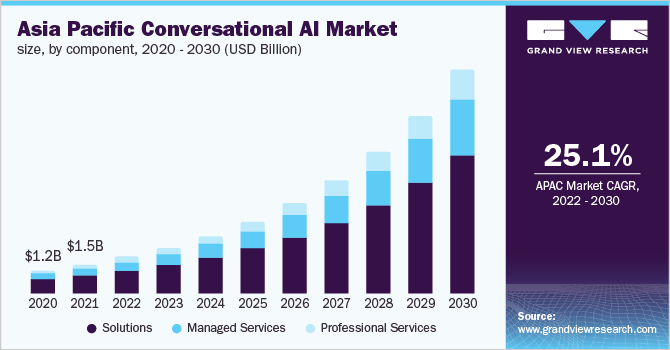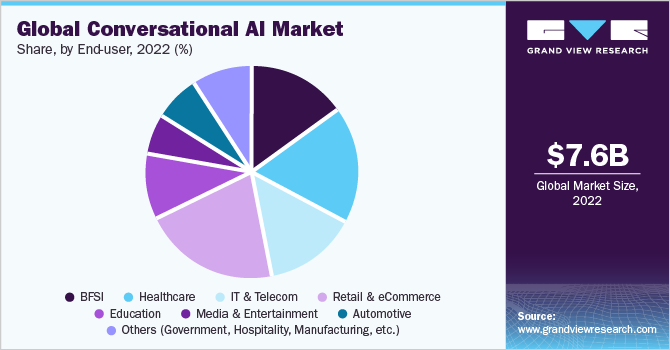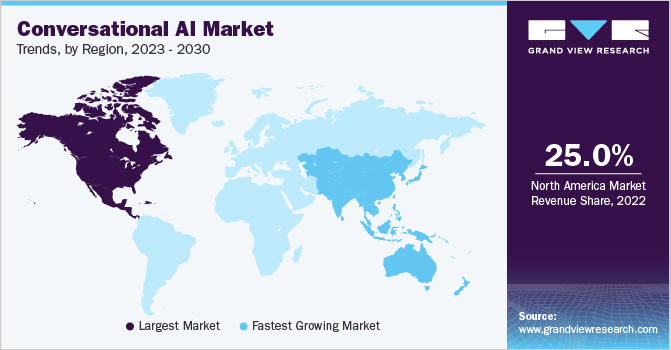- Home
- »
- Digital Media
- »
-
Conversational AI Market Size, Share & Trends Report, 2030GVR Report cover
![Conversational AI Market Size, Share & Trends Report]()
Conversational AI Market Size, Share & Trends Analysis Report By Type (Chatbots, IVA), By Deployment (Cloud, On-premise), By Technology (NLP, ASR), By End-user (Healthcare, BFSI), By Component, And Segment Forecasts, 2023 - 2030
- Report ID: GVR-4-68039-944-1
- Number of Report Pages: 100
- Format: PDF, Horizon Databook
- Historical Range: 2017 - 2021
- Forecast Period: 2023 - 2030
- Industry: Technology
Report Overview
The global conversational AI market size was estimated at USD 7.61 billion in 2022 and is anticipated to grow at a compound annual growth rate (CAGR) of 23.6% from 2023 to 2030. Key factors influencing the market growth include rising demand and reduced chatbot development costs, AI-powered customer support services, and omnichannel deployment. AI-powered messaging and speech-based apps are rapidly uprooting contemporary mobile and web applications and are consequently expected to emerge as a new mode of communication. The creation of hybrid conversational AI models that mix generative and discriminative methods is rising. These models might be more effective and efficient when doing tasks like picture classification, language translation, and natural language processing (NLP).

Many development initiatives are underway for the effective and efficient use of these technologies for enterprise use cases to solve actual business problems. Numerous generative Al businesses have emerged to use Al's capacity to provide human-like responses in a conversational context. It could transform how users communicate with technology by enabling more natural and human-like discussions that are catered to unique requirements and tastes.Public sector organizations are leaning increasingly toward using conversational AI platforms as governments worldwide attempt to allow broad-scale digital transformation and reimagine the citizen experience.
The development of mobile devices and the rise of digital native populations are fostering a trend where individuals expect to be able to interact with their governments instantly online. More public sector organizations will adopt conversational Al to increase productivity and efficiency, improving the overall process of digitally providing citizen services to meet this demand. The cognitive competencies of a conversational AI chatbot can be utilized in online assistance to consumers in their purchase journey. Nowadays, conversational AI products offer support for a restricted number of languages, and most virtual assistants and chatbots are better compatible with English.
However, conversational AI offerings have initiated serving support for regional languages, and the implementation of these products is gaining significant prominence across the globe. Prominent market participants are focused on enhancing their product and service offerings. For instance, recently, support for seven new languages for actions on Google Assistant has been offered by Google. With this upgradation, Google currently delivers support for 16 languages. Furthermore, in November 2021, Google introduced a new product, Bot-in-a-Box, to extend its operations in conversational AI. The Bot-in-a-Box platform permits companies to submit a chatbot with a current customer FAQ document to keep the service simple, whether from an internal document or a web page. With these new applications from Google Cloud, it becomes easier for corporations to launch chatbots using current customer FAQs.
Component Insights
The solution segment led the market in 2022 accounting for over 60.5% share of the global revenue. The leading share is attributed to companies' large-scale implementation of in-house conversational AI technologies. Moreover, AI-enhanced support systems can offer users accessibility to services and round-the-clock assistance, enabling organizations to deliver dependable customer service. For instance, in January 2022, Visionstate Corp. introduced innovative Vicci 2.0, a state-of-the-art conversational chatbot AI-powered customer service kiosk. Visionstate is implementing this technology into its Vicci 2.0 platform to serve on-site customer service influenced by AI. The Vicci 2.0 platform can back a broad range of consumers through its modification capability to support various languages.
The managed service segment is expected to register a CAGR of over 24% during the forecast period. Major players in the market, like Accenture, offer wholesome AI training and system integration services to enable businesses to implement AI advancements in their communication services. The company’s Conversational AI Platform is created to handle organizations' usual problems when executing conversational AI solutions. These challenges include delivering at pace, enhancing from proof of concept to enterprise-level, and how to operate a living system. By centralizing the maintenance, design, creation, and publishing of conversational experiences in a common platform, organizations can enable scaling across the enterprise by breaking conventional silos.
Type Insights
The chatbot segment led the market in 2022 accounting for over 67% share of the global revenue. Prominent development in machine learning (ML) and NLP in chatbots is augmenting the market growth. Chatbots are primarily used for collecting data. In addition, customers can engage with chatbots to obtain clarity about any product or service or if they need to book any appointments. With the advancement of NLP technology, chatbots can now comprehend and produce language like that of humans. Deep learning models and machine learning algorithms have been essential in improving chatbot accuracy and contextual awareness.
The Intelligent Virtual Assistants (IVA) segment is expected to register a CAGR of over 24% from 2023 to 2030. There are numerous conversational AI service providers in the market, developing virtual assistants and chatbots with restricted user-personalized characteristics. For instance, in September 2021, Astro, a new and different kind of robot, was launched. It is structured to help customers with tasks like keeping in touch with family and home monitoring. In November 2022, Alphabet, the parent company of Google, introduced Bard, an AI chatbot, throughout Europe and Brazil. The product has undergone its largest expansion since its launch in February. The bot competes with ChatGPT, which is supported by Microsoft.
Deployment Insights
The on-premises segment led the market in 2022, accounting for over 63% share of the global revenue. This is attributed to the flexibility delivered to the customer, due to which the transaction is done only once. The costs are relatively cheaper than expenditures incurred on the cloud by the consumer. Strict rules or concerns about data privacy and security may exist in some sectors, such as healthcare, banking, or government. Organizations have complete control over their data and lower the risk of data breaches or unauthorized access by keeping conversational AI on-premises, which is fueling segment growth. Moreover, when real-time communication and minimal latency are essential, on-premises conversational AI is useful. Organizations reduce network latency and guarantee quick reaction times by deploying the conversational AI system locally, which is crucial for time-sensitive applications.
The cloud segment is expected to register a CAGRof over 24% during the forecast period owing to the rising prominence of cloud-based technologies and services in businesses across the globe.Platforms for cloud conversational AI are frequently updated with new functions, enhancements, and developments in machine learning and natural language processing. By doing this, organizations benefit from the newest innovations and advancements without having to invest significantly in infrastructure or software changes.Global access to cloud conversational AI technologies enables companies to service clients in various time zones and geographical locations. Their universal accessibility increases the impact and reach of conversational AI applications.
Technology Insights
The NLP segment led the market in 2022 accounting for over 45% share of the global revenue. NLP ensures the processing of large quantities of natural language data. It also enables streamlining of the documentation processes to enhance their efficiency, including documentation accuracy. For instance, SAP (Systems, Applications, and Products in Data Processing) SE (Societas Europaea), a global operating software company based in Europe, developed current applications with improved, automated capabilities like automatic translation and the Incident Solution Matching service based on ML and AI advancements. Moreover, speech recognition systems that translate spoken words into written text are included in NLP. Thus, voice-based interactions with users can be facilitated by conversational AI systems that can process and comprehend spoken inputs.
The Automatic Speech Recognition (ASR) segment is expected to register a CAGR of 24.7% over the forecast period. ASR facilitates the creation of speech user interfaces that let people converse verbally with conversational AI systems. ASR systems enable natural and intuitive interactions by transcribing spoken inputs, giving users hands-free and eye-free experiences. Moreover, since there are differences in pronunciation, background noise, and other circumstances, ASR systems produce transcriptions that could be inaccurate. Methods including mistake correction algorithms and confidence scores are used to increase the accuracy of transcriptions and determine the degree of confidence in the speech recognized.
End-user Insights
Based on the end-user, the retail & eCommerce segment led the market in 2022, accounting for over 21% of global revenue. Through persuasive, more expressive, and intelligent conversational AI tools and techniques, the retail & e-commerce industries serve customers better. Conversational AI enables companies to provide chatbots and virtual assistants for round-the-clock customer service. These AI-powered customer service representatives can respond to frequent consumer questions, give product details, help with order tracking, and provide after-sale assistance. Conversational AI minimizes response times and increases customer satisfaction by providing immediate, personalized support.

The automotive segment is expected to register a CAGR of 26.2% over the forecast period. AI voice assistants can serve vehicle controls, alerts, real-time recommendations, and much more, catering to passengers and drivers for a more convenient daily commute.By offering voice-guided directions, real-time traffic updates, and contextual information about nearby sites of interest, AI improves navigation systems. Voice commands can be used by drivers to input locations, seek alternate routes, or inquire about gas stations, dining options, or parking facilities in the area.
The conversational AI healthcare chatbot is one of the most influential and mature AI-powered healthcare technology established so far, which stands to radically change the way patients, payers, and medical care providers interact with one another. These bots also play a crucial part in providing vital healthcare information to specifically targeted people at the right time. Healthcare or Medical chatbots can be implemented to achieve various objectives, from revealing valuable insights and improving healthcare systems to assisting medical personnel and improving patient experience.
Regional Insights
North America accounted for a dominant revenue shareof over 25% in 2022. The widespread adoption of emerging technologies and the rapidly increasing need for customer support services powered by AI are both driving regional marketgrowth. Furthermore, most organizations in North America are investing in technological advancements to satisfy and help their customers' requirements. The rapidly growing health consciousness among the population also fuels the demand for conversational AI. The healthcare industry in North America is advancing to implement augmented reality (AR), virtual reality (VR), robotics, and AI.

This would help deliver intelligent services and technologies for evidence-based health and focus on preventive and collaborative care. The Asia Pacific region is projected to witness the fastest growth rate during the forecast period. The growth is attributedto increasing awareness among organizations about innovative customer support services and technologies. In addition, increasing development in the e-commerce sector, rising acceptance of conversational AI in the retail industry, technological advancement in consulting & healthcare, and progressing internet penetration in this region.
Key Companies & Market Share Insights
The global market is fragmented with the presence of several SMEs and large-sized companies. Major market players adopt numerous strategies, such as contracts, agreements, acquisitions, mergers, implementing more improved technologies in conversational AI applications, and creating, testing, & launching new & enhanced solutions. For instance, in March 2023, the first product to combine existing conversational and ambient AI with OpenAI's most recent and potent model, GPT-4, is Nuance Communications, Inc.'s Dragon Ambient eXperience Express, a workflow-integrated, completely automated clinical documentation system, expanding the tried-and-true Dragon Medical product line while improving the market-leading DAX ambient solution. Some of the prominent players in the global conversational AI market include:
-
Google
-
Microsoft
-
Amazon Web Services, Inc.
-
IBM
-
Oracle
-
Nuance Communications, Inc.
-
FIS
-
SAP SE
-
Artificial Solutions
-
Kore.ai, Inc.
-
Avaamo
-
Conversica, Inc.
-
Jio Haptik Technologies Ltd.
-
Rasa Technologies Inc.
-
Solvvy
-
Pypestream Inc.
-
Kasisto
-
Cognigy
Conversational AI Market Report Scope
Report Attribute
Details
Market size value in 2023
USD 9.38 billion
Revenue forecast in 2030
USD 41.39 billion
Growth rate
CAGR of 23.6% from 2023 to 2030
Base year for estimation
2022
Historical data
2017 - 2021
Forecast period
2023 - 2030
Report updated
August 2023
Quantitative units
Revenue in USD million and CAGR from 2023 to 2030
Report coverage
Revenue forecast, company ranking, competitive landscape, growth factors, and trends
Segment scope
Component, type, deployment, technology, end-user, region
Region scope
North America; Europe; Asia Pacific; Latin America;Middle East & Africa
Country scope
U.S.; Canada; Germany; UK; France; China; Japan; India; South Korea; Australia; Brazil; Mexico; KSA; UAE; South Africa
Key companies profiled
Google; Microsoft; Amazon Web Services, Inc.; IBM; Oracle; Nuance Communications, Inc.; FIS; SAP SE; Artificial Solutions; Kore.ai, Inc.; Avaamo; Conversica, Inc.; Jio Haptik Technologies Ltd.; Rasa Technologies Inc.; Solvvy; Pypestream Inc.; Kasisto; Cognigy
Customization scope
Free report customization (equivalent up to 8 analysts’ working days) with purchase. Addition or alteration to country, regional & segment scope
Pricing and purchase options
Avail customized purchase options to meet your exact research needs. Explore purchase options
Global Conversational AI Market Report Segmentation
This report forecasts revenue growth at global, regional, and country levels and provides an analysis of the latest trends in each of the sub-segments from 2017 to 2030. For this study, Grand View Research has segmented the conversational AI market report based on component, type, deployment, technology, end-user, and region:
-
Component Outlook (Revenue, USD Million, 2017 - 2030)
-
Solutions
-
Managed Services
-
Professional Services
-
Training & Consulting
-
System Integration & Implementation
-
Support & Maintenance
-
-
-
Type Outlook (Revenue, USD Million, 2017 - 2030)
-
Chatbots
-
Intelligent Virtual Assistant (IVA)
-
-
Deployment Outlook (Revenue, USD Million, 2017 - 2030)
-
On-premises
-
Cloud
-
-
Technology Outlook (Revenue, USD Million, 2017 - 2030)
-
Natural Language Processing (NLP)
-
ML and Deep Learning
-
Automatic Speech Recognition (ASR)
-
-
End-user Outlook (Revenue, USD Million, 2017 - 2030)
-
BFSI
-
Healthcare
-
IT & Telecom
-
Retail & eCommerce
-
Education
-
Media & Entertainment
-
Automotive
-
Others (Government, Hospitality, Manufacturing, etc.)
-
-
Regional Outlook (Revenue, USD Million, 2017 - 2030)
-
North America
-
U.S.
-
Canada
-
-
Europe
-
Germany
-
UK
-
France
-
-
Asia Pacific
-
China
-
Japan
-
India
-
South Korea
-
Australia
-
-
Latin America
-
Brazil
-
Mexico
-
-
Middle East and Africa (MEA)
-
Kingdom of Saudi Arabia (KSA)
-
UAE
-
South Africa
-
-
Frequently Asked Questions About This Report
b. The global conversational AI market size was estimated at USD 7.61 billion in 2022 and is expected to reach USD 9.38 billion in 2023.
b. The global conversational AI market is expected to grow at a compound annual growth rate of 23.6% from 2023 to 2030 to reach USD 41.39 billion by 2030.
b. North America accounted for the highest value share in 2022 owing to Al's strong research and development capabilities in developed economies, research institutes, and several prominent Al enterprises in this region.
b. Some key players operating in the conversational AI market include• Google, Microsoft, Amazon Web Services, Inc., IBM, Oracle, Nuance Communications, Inc., FIS; among others.
b. Key factors that are driving the market growth include rising investment in advanced technologies and increasing demand for AI-powered customer support services.
Share this report with your colleague or friend.
![gvr icn]()
NEED A CUSTOM REPORT?
We can customize every report - free of charge - including purchasing stand-alone sections or country-level reports, as well as offer affordable discounts for start-ups & universities. Contact us now
![Certified Icon]()
We are GDPR and CCPA compliant! Your transaction & personal information is safe and secure. For more details, please read our privacy policy.
We are committed towards customer satisfaction, and quality service.
"The quality of research they have done for us has been excellent."





